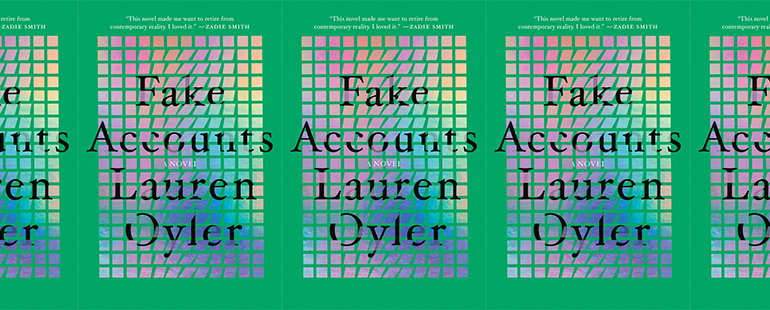How Do You Fictionalize the Experience of Social Media?

How do you dramatize the experience of social media? Lauren Oyler wrestles with this question in her debut novel, Fake Accounts, a book whose plot largely transpires online. Near the midpoint, the narrator emerges from a deep dive into her Twitter timeline. After a multi-page catalog of the various newsfeed tidbits that have diverted her attention (“Marie Le Pen’s niece said France, with its Greco-Roman and Christian roots, was facing a choice between globalism and survival . . . Someone I’d met once in New York liked my post”), Oyler issues readers something of an apology: “This is the struggle with describing social media,” she writes. “It devours importance.”
This is manifestly true, and it represents a challenge for contemporary writers. The majority of what we consume online is unfocused and chaotic, difficult to incorporate into any sort of linear narrative. Yet for many of us, social media has become an inescapable feature of reality, and no account of contemporary life can feel real and truthful if it doesn’t grapple with its impact.
Many books of recent vintage have addressed this conundrum by depicting social media as an alien invader of our collective consciousness, a hostile presence foisted upon us by malevolent tech overlords. In Hari Kunzru’s Red Pill, for instance, the protagonist is driven to a schizophrenic breakdown by a heavy dose of information overload and the subliminal influences of an alt-right internet troll. In Anna Wiener’s memoir, Uncanny Valley, a naive ingenue arrives at a Silicon Valley startup with hopes of personal growth, only to become disenchanted with the industry’s messianic culture and complete disregard for social responsibility. In this approach to writing about the internet, users are cast as victims of a techno-capitalist elite bent on rewiring the world whose missionary zeal blinds them to the collateral damage caused by their grand social experiment. More often than not, books of this mold (including the two mentioned above, as well as James Lasdun’s Afternoon of a Faun (2019), Meg Wolitzer’s The Female Persuasion (2018), and Sarah Gerard’s True Love (2020)) culminate with Donald Trump’s shocking electoral victory in 2016, portraying that November evening as a shattering wakeup to the ramifications of our collective online addiction, a cultural ur-moment when the consequences of living a virtual fantasy life came crashing into reality.
Oyler’s book takes a different approach, zeroing in on our own complicity in creating the hellscape that is the internet today. Instead of being a hapless victim, her unnamed protagonist is a producer of social media content, a writer for a popular website resembling Vice who enjoys a “modest but respectable number of Twitter followers, in the mid four figures.” Like an ever-proliferating class of internet users, this positions her as something of an entrepreneur in the information economy, an influencer on a local scale. As such she spends almost the entirety of the novel staring into a smartphone screen or else wandering around in a solipsistic dream state, generating tweets and spiteful takes in her head.
Indeed, Fake Accounts is so embedded in its narrator’s internet-addled consciousness that, when traditional writerly crafts like landscape description or facial physiognomy are called for, Oyler obliges begrudgingly, writing with almost aggressively unvarnished prose. “He had thick brown hair cut into a normal male shape,” she says of one character. Elsewhere, she writes of the landscape, “The sun had only just begun its slow summer descent and reflected orangely on the nearby tram tracks.” Yet she details her character’s forays into internet wormholes with minute precision, down to the all-too-familiar posture of the cell phone addict: “I was getting a twinge in my lower back, never bothering to find a more comfortable position because I always assumed I’d be getting out of bed any minute.”
This isn’t to say that nothing happens in the book; Fake Accounts features a number of dramatic events that take place in the physical realm. At the outset, for instance, in the weeks immediately following Donald Trump’s election—here, Trump is an inciting incident rather than a climax—the protagonist discovers her boyfriend is an online influencer like herself, only his Instagram account is anonymized and secret and peddles right-wing conspiracy memes to a group of rabid followers. Is it ironic? Is it an art project? It’s never made clear, because before the protagonist can confront her boyfriend, he dies in a bike accident, following which she quits her job and moves to Berlin. Aside perhaps from the apps involved, this is the stuff of traditional literary drama—deaths, breakups, urban relocations. Yet all these events are situated at the knife’s edge where reality and virtual reality converge, and Oyler’s narration of them is intensely, even radically, mediated by technology. When the narrator learns about her boyfriend’s death, for example, she retires to her room, cries for a few minutes, and then has the following train of thought:
A woman I worked with used a photo of a pink neon sign that read ‘FEELINGS’ in all capital letters as the background image on one of her social media accounts. FEELINGS were popular at the time—expressing them was seen as a kind of feminist statement, the reclamation of an ‘inappropriate’ femininity previously dismissed as frivolous or hysterical, and as a result people were constantly declaring (on social media) the intensity of their emotions . . . Now that I had actual feelings, unlikely given the almost-laughable originality of the situation to have been anticipated, I could say for certain the whole trend was absurd. Feelings are nothing like a pink neon sign at all.
Even undergoing the most IRL emotion possible—grief—Oyler’s protagonist can’t turn off the part of her brain that compares every assertion to something irritating someone has written online. She can only experience life second-hand, filtered through the lens of her social media newsfeed.
Oyler herself is something of a literary provocateur. Fake Accounts is her first novel, but she has the uncommon distinction of being a book reviewer whose essays have repeatedly gone viral. Although her criticism is wickedly sharp and probing, with a sense for the jugular reminiscent of Mary McCarthy, part of her viral appeal also undoubtedly stems from the fact that her harsh assessments of zeitgeisty authors stand out in a climate that typically selects for performative (and, often, disingenuous-sounding) enthusiasm. Writing about Jia Tolentino’s Trick Mirror for the London Review of Books, for example, Oyler memorably charged: “She is careful to mention her relative ‘luck’ and privilege before she complains, but usually only so that she can justify aligning herself with the suffering of people with whom she has little in common.” Her review of Kristen Roupenian’s You Know You Want This, also for the LRB, contains the damning assessment: “Roupenian’s desire to have her moral and reject it too could be said to put a twist on the twist: she has somehow managed to make these stories both unpredictable and unsurprising.” Oyler has also published scathing reviews of works by Roxanne Gay, Sally Rooney, and Meg Wolitzer, to name a few.
Conspicuously, many of her targets are young millennial women. Oyler’s bête noire as a reviewer seems to be a particular version of online feminism popular among millennials, one she believes has seeped into contemporary writing and is busy poisoning the well. She articulates this most expansively in her Tolentino review, in which she coins the intentionally provocative term “hysterical criticism” (borrowing from James Wood’s “hysterical realism”) to characterize the kind of writing she reviles:
These [writers] aren’t hysterical because they have uncontrollable, misunderstood responses to social problems; they perform hysteria because they know their audience respects the existence of those problems, and the chance that they may be sincere makes them difficult to criticise . . . . The moral obviousness of most contemporary fiction—and of most movies, art, music, television, politics and internet culture—has been a boon for these writers, who tend to find simple things complicated and complicated things simple.
One ramification of this tendency, Oyler continues, is that “hysterical critics are self-centered . . . [they] can make any observation about the world lead back to their own lives and feelings, though it should be the other way around.” A discourse network that algorithmically prioritizes likes and retweets will naturally reward writers who master the arts of humblebragging, performative outrage, and self-promotion, rather than the arts of careful observation and delicate irony. (“I’m ironic,” Oyler’s protagonist quips in Fake Accounts. “Also a marginalized identity these days.”) As the literary community increasingly structures itself around social media and its perverse incentives, Oyler believes, we’re losing the purchase on reality that writing is supposed to supply.
Fake Accounts excels at navigating the fantasyland that has usurped reality’s place. Yet one of its most interesting moments comes toward the end when Oyler’s protagonist briefly abandons the book’s present-tense mode of narration and gives readers a glimpse into her past, offering an interpretation of how we arrived at this point in the first place. Spurred by an experiment with online dating, she reflects back on when she was seven years old and her mother took her to see a screening of Harriet the Spy. In the 1996 film, starring Michelle Trachtenberg and Rosie O’Donnell, the eponymous Harriet keeps a diary of cruel observations about her friends that is discovered by a classmate. When the classmate reveals the notebook to their class, Harriet’s friends turn on her, upset by her brutally honest depictions of them. “The happy ending only arrives,” Oyler writes, “after Harriet’s former nanny, Rosie O’Donnell, advises her to apologize to everyone and to lie about how she didn’t mean the cruel things she wrote.” As Oyler’s narrator reminisces:
When I saw this as a child, I didn’t take away the lessons intended, which were that lying or omitting the truth is sometimes necessary to maintain friendships . . . Instead, I began to fantasize about undergoing Harriet’s dramatic ordeal myself. The idea that everyone I knew might care about my private thoughts was appealing, as was the possibility of people knowing my negative internal monologue without my having to tell them. When the class became obsessed with making Harriet miserable, all I could see was that they were obsessed.
Inspired by Harriet, Oyler’s narrator attempts to reenact the movie, putting her unwitting friend Kayla in the role of Harriet’s classmates by filling a notebook with mean thoughts and leaving it for Kayla to discover. Unsurprisingly, she soon receives a call from Kayla’s mother, who has just read the notebook and is shocked at her unprovoked act of cruelty. Oyler writes:
I do remember panicking as soon as I realized that what I’d done would have consequences beyond being sent to my room. I had ceded my thoughts in exchange for becoming the focus of attention, and now I had less control over who I was to other people. Kayla and her mother would forever see me a certain way—as a careless little bitch who didn’t know what she was talking about. But a careless little bitch who didn’t know what she was talking about is not as bad as what I actually was: someone who would rather other people think of her as a careless little bitch who didn’t know what she was talking about than not think of her at all.
This is the unvarnished reality of the social media economy, Oyler seems to be asserting. Any protestations to the contrary, like the feel-good bathos proffered by the “hysterical realists,” are exercises in bad faith. Social media offers users a Faustian bargain: “cede your thoughts”—especially the most polemical and self-serving of them—“in exchange for becoming the focus of attention.” What’s surprising is how many of us are willing to accept such a bargain. Considering Oyler’s dim view of human nature, perhaps it shouldn’t be. The protagonist of Fake Accounts exemplifies the hypocrisy, her mockery of her internet-addled peers belied by her total dependence on the gratification of Twitter notifications. Seen in this light, Fake Accounts is an audacious, mordant, and frequently hilarious sendup of internet culture at the turn of the decade, and a likely harbinger of how novels about the internet will read in years to come.
This piece was originally published on February 1, 2021.



